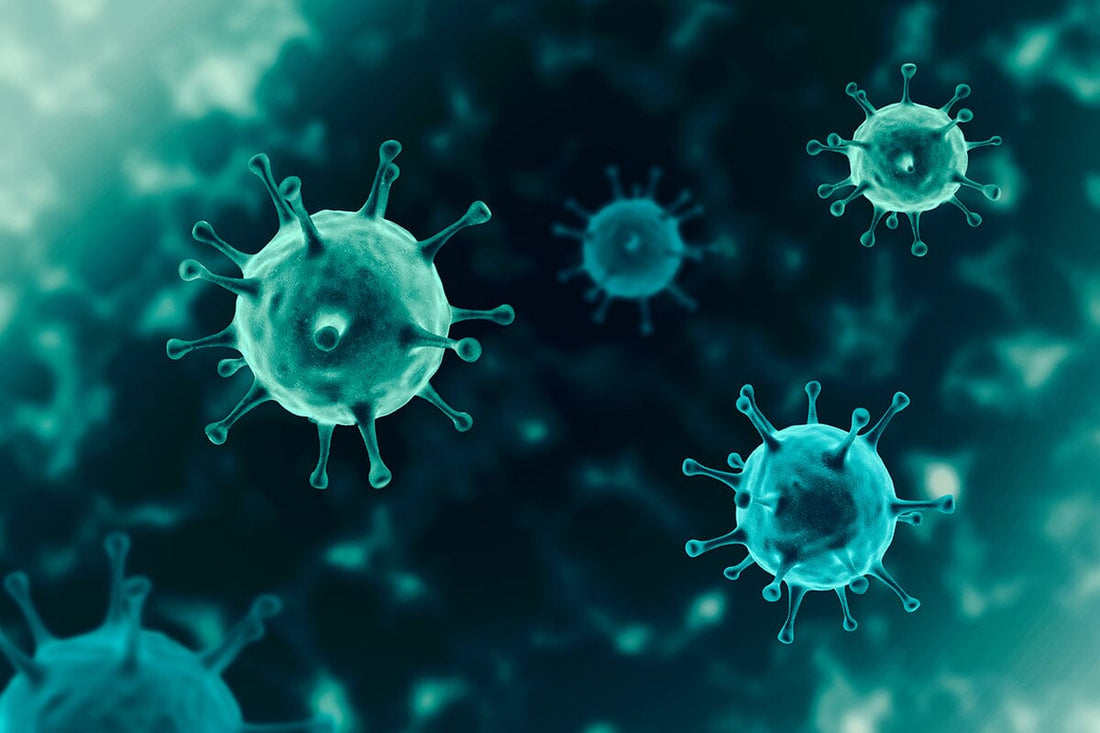Hello! This is Fusubon Kawatani.
The novel coronavirus (COVID-19) is raging. In the midst of this, I received an inquiry asking whether people with diabetes are more susceptible to COVID-19, so I decided to learn more about immunity, starting with what it means.
What is Immunity?

Novel coronavirus image
We often talk about having immunity or not having immunity, but our immune system is two-tiered: innate immunity and adaptive immunity.
The former is an immune system that we are born with, while the latter is an immune system that we acquire as we go about our daily lives.
What is innate immunity?
Physical and chemical barriers
Pathogens are also called antigens. In this case, the pathogen is a virus.
It prevents viruses from entering our bodies through the skin and mucous membranes.
These are called physical and chemical barriers.
Cellular Barrier
Next, when the virus passes through the barrier, cells called phagocytes (macrophages and dendritic cells), such as white blood cells, eat the virus. A major feature of this innate immune system is that it can work very quickly (within a few minutes to an hour), but it cannot remember viruses it has previously eaten.
Phagocytes also inform lymphocytes, which will be discussed next, of the virus' invasion.
The two barriers mentioned above are about 80% complete when we are born.
What is Acquired Quarantine Mechanism?
Cellular and humoral barrier
In response to this, lymphocytes in the adaptive immune system produce antibodies, which bind to the invading virus and kill it.
In addition, some lymphocytes produce cells called killer T cells, which kill the cells in which the virus has taken up residence. Lymphocytes have the above-mentioned very important roles.
The receptors that lymphocytes have are often compared to keyholes. Lymphocytes have more than a few million different types of keyholes and can respond to any antigen.
When an antigen enters the body and fits into the keyhole, a specific antibody attacks the antigen and increases the number of lymphocytes that contain that keyhole.
It takes time (about a few days) for lymphocytes to deal with an unknown antigen, but even if the same virus enters the body later, they will remember it (by increasing and preserving the lymphocytes that fought against it) and will be able to deal with it immediately.
What surprised me was that there are a small number of lymphocytes that have a keyhole that responds to any antigen. You might think that antibodies are made from scratch, but there are lymphocytes that can respond to any antigen, and it takes time for these lymphocytes to multiply.
Even twins do not grow up in exactly the same environment, so their adaptive immune systems are different.
There are three types of antibodies

Image of lymphocytes binding to antigens
Even if lymphocytes and antibodies against a specific antigen are increased, problems can still occur when the antibodies are unable to deal with the antigen or have a different adverse effect.
Good antibodies
Antibodies kill viruses and other pathogens when they enter the body.
Bad antibodies
When a pathogen such as a virus enters the body, these antibodies do not act on the virus, but rather have a negative effect such as aggravating the disease. It has been reported that in SARS (Severe Acute Respiratory Syndrome) and MERS (Middle East Respiratory Syndrome), bad antibodies are produced along with good antibodies.
Useless antibodies
This is known as an antibody against HIV (human immunodeficiency virus).
Although antibodies are produced, they do not kill HIV (human immunodeficiency virus).
Antibodies from severe COVID-19 patients
When examining the bodies of patients with severe COVID-19, it has been found that the amount of antibodies has also increased. Normally, if the antibodies are increased, the patient will not become seriously ill, but it has been found that these antibodies are not functioning properly.
In other words, people who become seriously ill with the coronavirus may have anti-virus or bad antibodies in their bodies.
Therefore, even if you have antibodies against the new virus, it would be ideal if we could only test for the good antibodies, but there are only a few facilities that can do such tests, and there is a risk that an antibody test will show you have antibodies even if you have bad antibodies, anti-virus antibodies, or antibodies to the coronavirus that are no different from those found in the common cold, so you need to be careful about this.
So far, we have learned briefly about the immune system.
Now let's get to the main topic, which is whether diabetic patients are more likely to develop severe symptoms if they contract COVID-19.
References Author: Masayuki Miyasaka "Strengthening the immune system: The latest science on vaccines and immune systems"
Diabetics have a weakened cellular barrier function

Image of macrophages consuming antigens
In the bodies of diabetic patients, the ability of the white blood cells (eosinophils) that form the cellular barrier of innate immunity mentioned above is reduced .
Specifically, the speed at which they move to antigens slows down (decreased migration ability), and the opsonization function that processes pathogens to make them "easy to eat" by neutrophils slows down, preventing the crucial phagocytosis. This causes the defense in the early stages of infection to go wrong, leading to the spread of infection. Furthermore, fluctuations in blood sugar levels further reduce the function of neutrophils, leading to the progression of the disease.
In an epidemiological study in Australia that analyzed data from 118,982 type 1 and type 2 diabetes patients, 6,444 people died from common infections, pneumonia, sepsis, and osteomyelitis during the follow-up period (median 6.7 years). Compared to the general population, the risk of death from infectious diseases was reported to be 4.42 times higher in type 1 diabetes and 1.47 times higher in type 2 diabetes. The COVID-19 epidemic will likely continue for some time. People with diabetes, whether type 1 or type 2, should pay more attention to their health than usual and take thorough measures to prevent infection and control their blood sugar.
Why COVID-19 is more likely to become severe in people with diabetes. Quoted from an article by medical writer Yukie Ide in Diamond Online.
summary
As mentioned above, diabetics are not particularly at risk because of the new coronavirus; rather, because their cellular barrier function is weak to begin with, they have a weak approach to antigens and their delivery to lymphocytes is delayed, so they are always at risk when confronted with an unknown virus for which there is no vaccine.
Be careful not to eat too much sugar in your daily life to avoid developing diabetes. See you next time!

